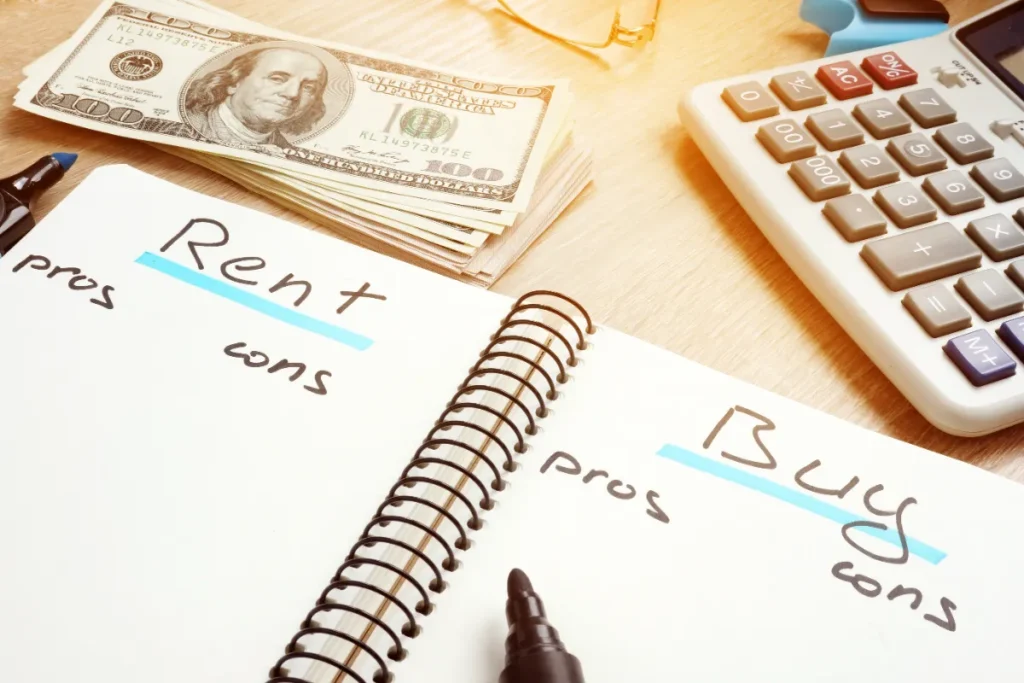
The decision between buying and renting a home is more than just a financial calculation; it’s a choice that speaks to your lifestyle, your future goals, and your personal values. In a world where housing options are as diverse as the individuals seeking them, understanding the ins and outs of buying versus renting is crucial. This guide is crafted to go into these options in depth, providing a thorough analysis that will aid you in making an informed and strategic decision about your next home.
Buying a Home: The Pros
Building Equity and Long-term Financial Health
- Equity Growth: Each mortgage payment is not just an expense but an investment in your financial future. Over time, this builds equity, a valuable asset that can serve as a financial safety net or a stepping stone to future property purchases.
- Potential for Appreciation: Real estate often appreciates over time. This increase in value can result in a significant financial gain if you decide to sell, potentially offering a higher return on investment compared to other asset classes.
Stability, Personalization, and Community Ties
- Creating a Permanent Home: Owning a home offers a sense of permanence and belonging, often leading to stronger community ties and a more stable family environment.
- Freedom to Personalize: As a homeowner, you have the liberty to make changes to your property, from painting walls to complete renovations, allowing you to create a space that truly reflects your personal taste and lifestyle.
Financial Benefits Beyond the Mortgage
- Tax Benefits: Homeownership can bring various tax benefits, including deductions on mortgage interest and property taxes, potentially leading to significant annual savings.
- Fixed Mortgage Payments: Opting for a fixed-rate mortgage ensures that your payments remain consistent over the years, protecting you from the unpredictability of rising rental costs.
Buying a Home: The Cons
Upfront and Ongoing Financial Commitments
- Initial Investment: The initial costs of buying a home, including down payment and closing costs, are substantial and require significant savings or financial planning.
- Recurring Expenses: Beyond the mortgage, homeowners face regular expenses such as property taxes, insurance, maintenance, and unexpected repairs, which can be substantial and unpredictable.
Less Flexibility and Market Exposure
- Commitment and Inflexibility: Selling a home is a complex, time-consuming, and often costly process, making it less flexible than ending a rental lease.
- Market Risk: The value of your home is subject to market fluctuations. In a declining market, you might find yourself with a property that’s worth less than what you paid for it.
Renting a Home: The Pros
Flexibility and Ease of Mobility
- Ease of Relocation: Leasing provides the flexibility to move with relative ease, making it an ideal option for those who anticipate career moves, lifestyle changes, or simply desire a change of scenery.
- Maintenance-Free Living: One of the significant advantages of renting is that the landlord typically handles most maintenance and repairs, relieving you of these responsibilities and potential unexpected expenses.
Financial Simplicity and Lower Upfront Costs
- Reduced Initial Financial Burden: Renting typically requires less money upfront compared to the substantial investment needed for a home purchase. This can be particularly advantageous for those who are not yet ready or able to commit a large sum of money.
- No Property Taxes or Insurance Worries: As a tenant, you are not directly responsible for property taxes or homeowners’ insurance, two significant expenses that homeowners must manage.
Renting a Home: The Cons
No Equity Building and Potential for Increasing Costs
- Lack of Investment in Equity: Rent payments go towards the landlord’s mortgage, not your future financial gain. This means you miss out on building equity and benefiting from potential property appreciation.
- Vulnerability to Rent Increases: While you may start with an affordable rent, landlords can increase rent over time, subject to market trends and rental laws, potentially making your living situation less affordable in the long run.
Limitations on Personalization and Potential Instability
- Restrictions on Making Changes: Renters often face limitations when it comes to changing their living space. This can range from restrictions on painting walls to being unable to undertake any significant renovations.
- Uncertainty of Lease Renewal: Renting brings a degree of uncertainty; landlords may choose not to renew your lease for various reasons, leaving you in a position where you might have to find a new place to live on short notice.
The choice between buying and renting a home is many sided and deeply personal. It involves balancing financial considerations with your lifestyle needs, future plans, and personal preferences. Buying a home offers the potential for long-term financial gain, stability, and personalization, but it comes with a substantial upfront investment and ongoing financial responsibilities. Leasing, on the other hand, provides greater flexibility and a lower initial financial burden but lacks the long-term financial and personal benefits of homeownership.
In making this decision, it is essential to thoroughly evaluate your current financial situation, consider your long-term goals and lifestyle preferences, and weigh the pros and cons of each option. Remember, the best choice varies for each individual and situation.
Whether you choose to buy or lease, the decision should align with your broader financial strategy and life goals. It’s not just about where you live; it’s about how that choice fits into your overall life plan. Consider seeking advice from financial and real estate professionals to guide you in this important decision. Ultimately, your home, be it owned or rented, is the backdrop to your life’s story – choose a setting that supports and enriches your narrative.
